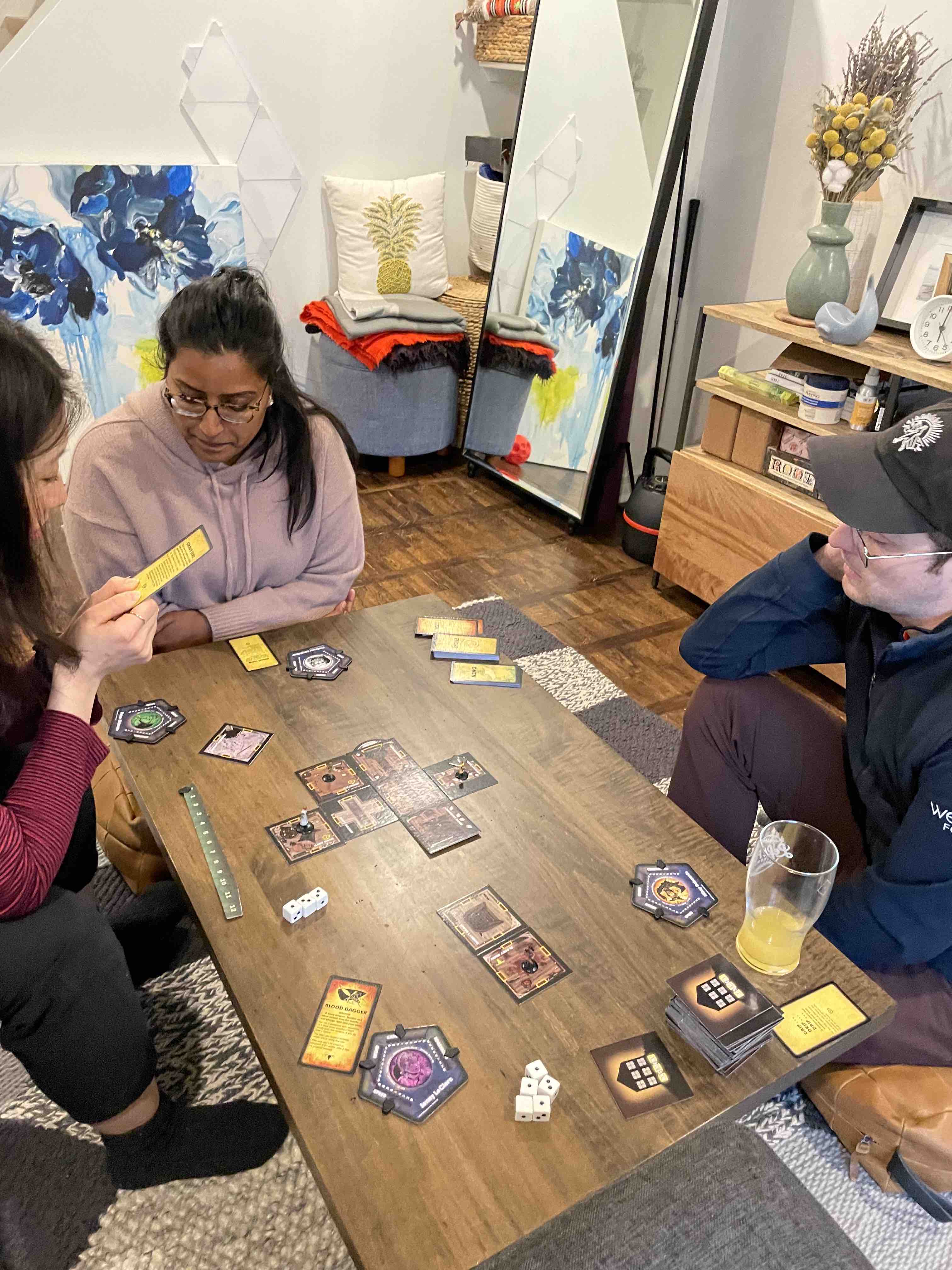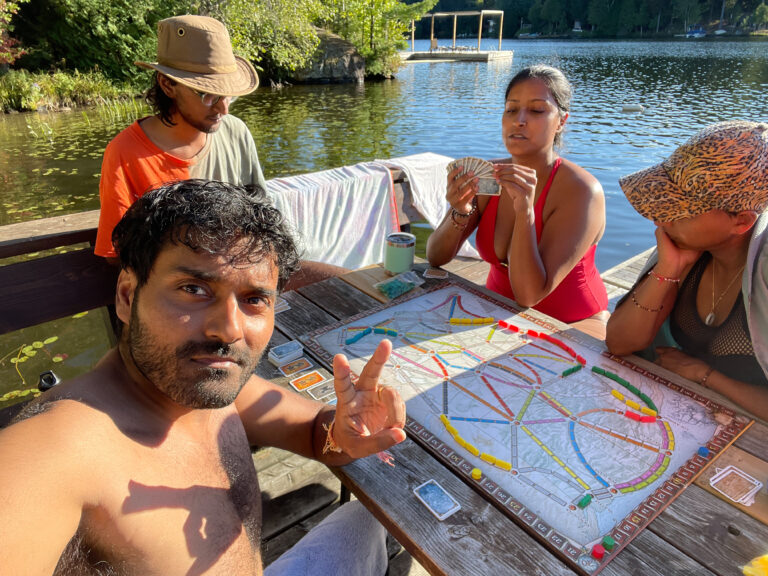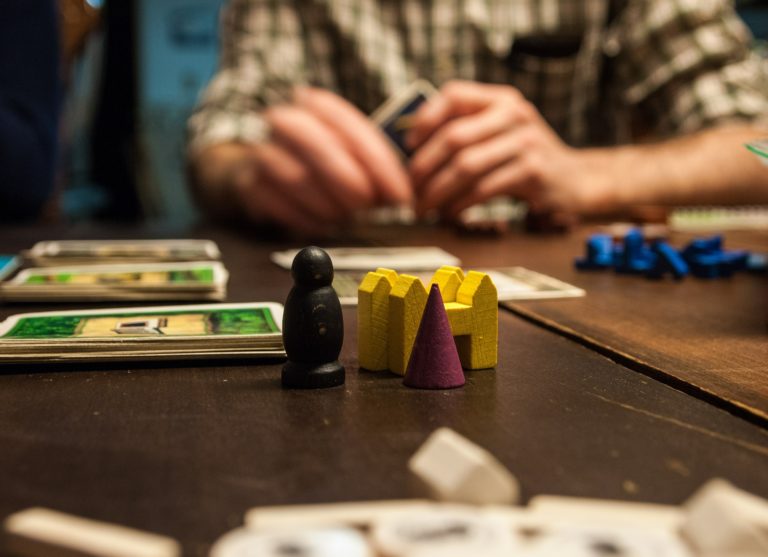Working in an office, my colleagues and I have spent countless lunch breaks breaking bread while breaking alliances, feasting on calories while feuding over strategies.
Office board games! They’re a fantastic way to clear your mind and recharge for the afternoon grind.
So, why not share meal-time with your co-workers and try these 5 office friendly board games, playable in 60 minutes or less!
Article Contents:
- Monopoly Deal · 15 – 20 mins · 2 to 5 player
- Survive: Escape from Atlantis! · 45 – 60 mins · 2 to 4 player
- Carcassonne · 30 – 45 mins · 2 to 5 player
- Coup · 15 – 20 mins · 2 to 6 player
- Codenames · 20 – 25 mins · 2 to 8 player
Only have two players? Check out the Best Two-Player Board Games.
Gameplay: 15 to 20 minutes
Players: 2 to 5
Transportability: High
Difficulty to Learn: Low
Setup Time: 1 minute
Expansions: No
Price: $5 – $10
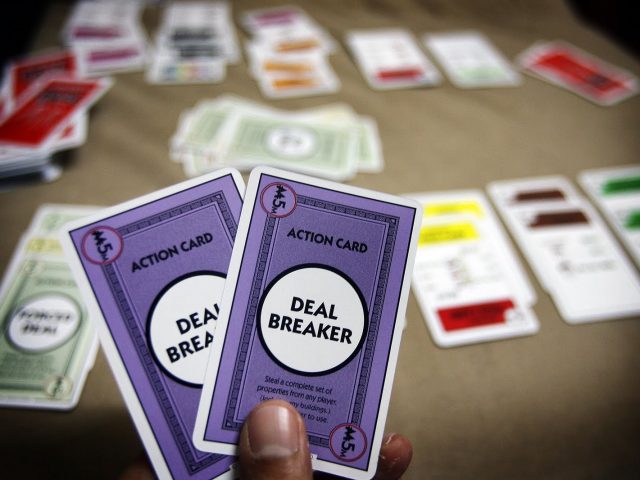
Monopoly Deal is a card game that is just as competitive as its older brother but at a fraction of the time (and cost!).
It’s loads of fun with virtually zero setup and takedown time making it the perfect workplace board game during lunch or a short break.
Synopsis
The goal of Monopoly Deal is to collect 3 complete sets of properties of different colours. Each player starts with 5 cards. On your turn, you draw two cards and play up to three cards.
Cards can be played as either properties, enhancements to your properties (houses or hotels), actions (collect rent, birthday money or steal/swap property cards) or added as money to your bank account. It’s just that simple.
It’s so easy, kids as young as 8 can learn to play. And, unlike regular Monopoly, Monopoly Deal actually ends fast enough that you can play over and over again!
Why it’s Great
The low setup time, simple rules and high re-playability makes Monopoly Deal great for the office.
And, unlike classic Monopoly, you don’t have to wait 3 hours and ruin a friendship to see who wins (well, maybe!).
Looking for the complete rules to play Monopoly Deal? Check them out here.
Gameplay: 45 to 60 minutes
Players: 2 to 4
Transportability: Low
Difficulty to Learn: Low
Setup Time: 5 minutes
Expansions: No
Price: $40 – $50
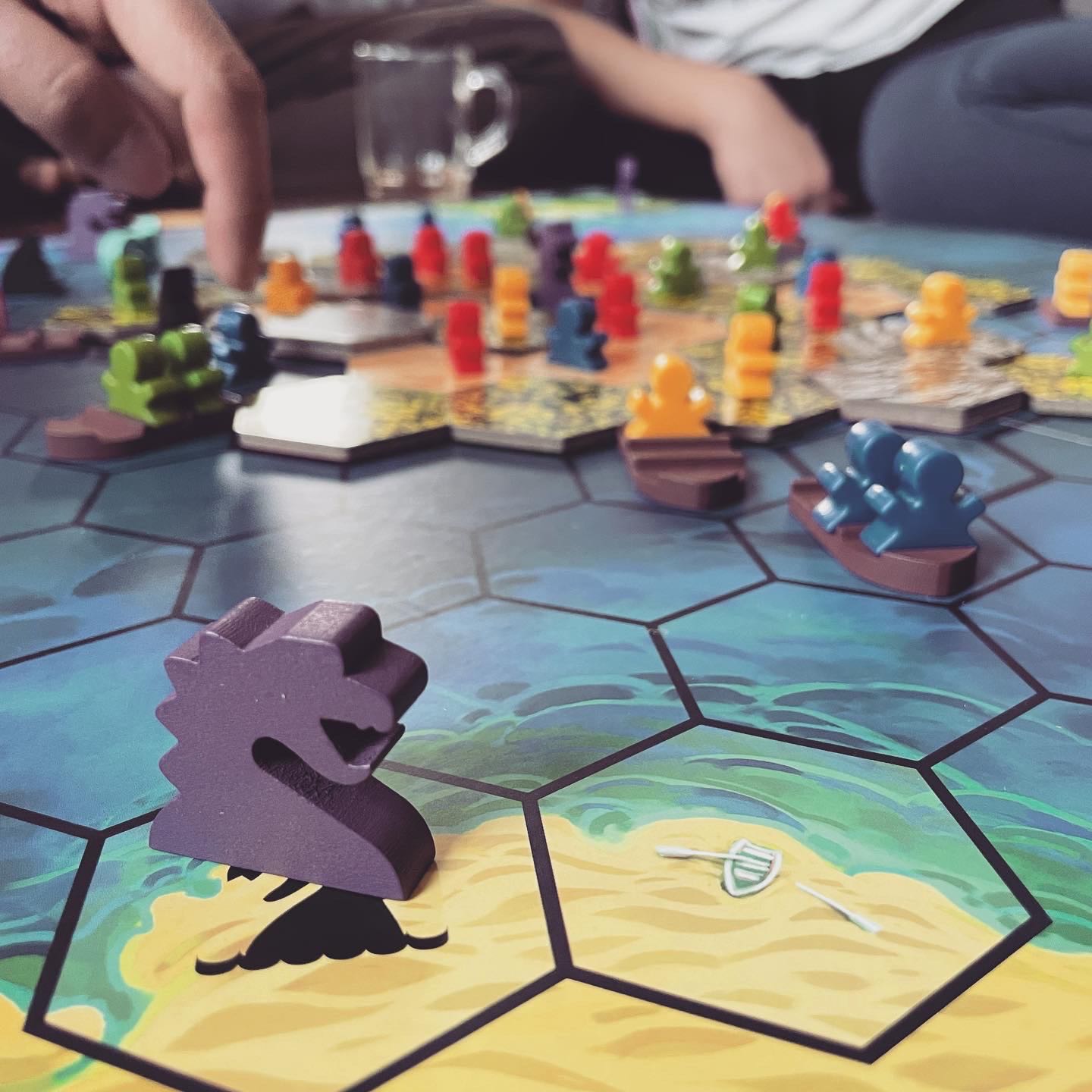
Get your players off a volcanic island that’s poised to explode – Seems simple, right?
But, add in a few sharks, whales and sea serpents, pepper in some occasional sabotage, and you’ve got a recipe for an intense lunch hour!
Synopsis
Game setup consists of shuffling and arranging hex-shaped terrain tiles onto the game board to build the island. Players are given 10 explorer meeples and 2 boats. Players take turns placing their explorers on the island, maintaining one explorer per tile. The boats are then placed in turns, along with sea serpents (we call them Krakens!) on their respective sea spaces.
Printed on the bottom of each explorer is a number of points, numbered 1 to 6. Only at the beginning do you see this number, so memorization is an asset! The goal of Survive is to get as many of your explorers (and points) off the island before it explodes and to land, located across the sea at the corners of the board. The player with the most points wins. Let the madness commence!
Gameplay consists of 4 sequenced actions: (1) Playing a tile in your hand [skipped during the first round]; (2) moving explorers or boats up to a total of three tiles; (3) removing a terrain tile (starting with all beaches, then forest, then mountain); and (4) rolling the dice and moving sea creatures. Sea serpents move 1 sea space, sharks move up to two spaces, and whales move up to 3 spaces.
Any removed green-edged terrain tiles are played right away and can reveal anything, from a shark, to a whale, to a whirlpool. Sharks eat people in the water and don’t affect boats, whereas whales eat boats and don’t affect people. Sea serpents eat both. Pretty standard Jaws / Moby Dick / Clash of the Titans rules.
If you remove a terrain tile and it’s a red-edge tile, you can keep it in your hand and play it later, either before your turn or in defence. Once played, the tile is removed from the game.
It’s a mad dash to get to land safely. You can either choose to swim, one sea space per explorer per turn, or by boat, but only if you maintain an equal or majority number of explorers on the boat. Playing clockwise, players take turns performing the four sequence actions until the volcano tile is revealed signifying the island has gone Mount Vesuvius and the game is over.
Why it’s Great
Sink or swim, sabotage and survive, Escape from Atlantis isn’t a cooperative game in the slightest.
The unpredictability of players, and, at times, the pure cut-throat action makes this an exciting lunch time office board game!
Looking for the complete rules to play Escape from Atlantis? Check them out here.
Gameplay: 25 to 45 minutes
Players: 2 to 5
Transportability: Medium
Difficulty to Learn: Medium
Setup Time: 2 minutes
Expansions: Yes
Price: $35 – $45
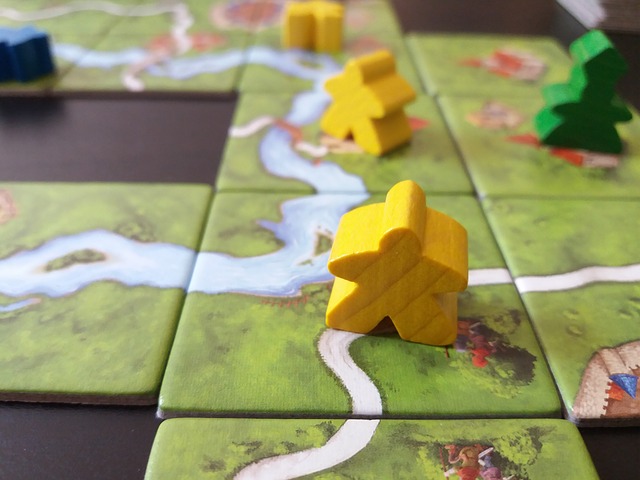
When you’re itching to play an office board game that’s both competitive and quick, Carcassonne is the game to play.
Setup consists of taking out the scoring board, choosing a color of “followers” and mixing up the game tiles face-down in the box. That’s it!
Synopsis
A starter tile is placed face-up in the center of the playing table. Players then take turns choosing tiles randomly and placing them face up on the table, connecting new tiles to the existing tile(s). Tiles must fit together such that the “border” of the tiles work together.
A new tile, when connected to an existing tile, completes the map without producing a fallacy, such as a road ending abruptly, a field-edged tile connected to a city-edge tile, etc.
After placing a tile, the player can take one follower from his/her supply and place it on the tile that he/she just placed. The follower can be placed in a city (knight), on a road (thief), on a monastery (monk) or on a section of field (farmer).
By completing a road, city or monastery, points are awarded immediately and followers on the scored/completed structures are then placed back into the player’s supply. Farmers are scored at the end of the game, along with followers on unfinished structures.
The game ends when there are no more tiles to play and the player with the most points wins!
Why it’s Great
The randomness of the tiles, the additional challenges and opportunities presented from the expansions, and the ability to wreak havoc on your opponent’s gameplay are essential to why Carcassonne is a workplace favourite.
Looking for the complete rules to play Carcassonne? Check them out here.
Gameplay: 15 to 20 minutes
Players: 3 to 6
Transportability: High
Difficulty to Learn: Low
Setup Time: 1 minute
Expansions: No
Price: $10 – $15
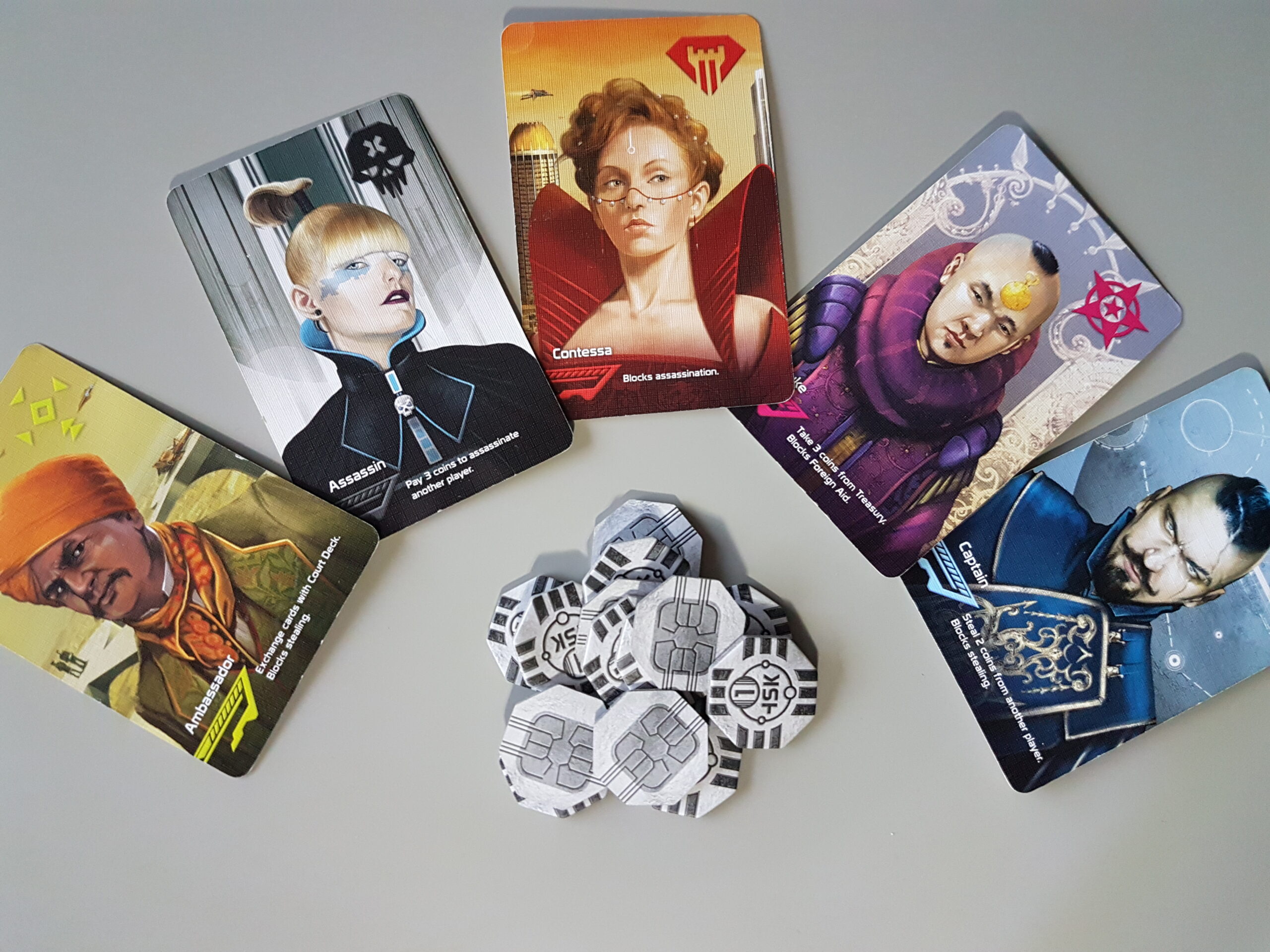
Deception and deduction is the name of the game playing Coup. Lie, cheat and steal your way to victory, but only if you don’t get caught…
Synopsis
Shuffle the character cards and deal two to each player, face down. Each player looks at their characters but keeps them hidden from everyone else. Two coins are also dealt to each player.
There are 5 characters in the deck, each with 3 copies: The Duke, Assassin, Captain, Ambassador, and Countessa. Each character has one or more unique abilities. These abilities include stealing coins, blocking stealing attempts, assassinating a character, blocking an assassination attempt, receiving taxes, or swapping a character card with a new one from the deck.
Once players review their cards, the mayhem begins! Each player takes a turn and completes one of the following actions:
- Receive Income: Take one coin from the bank which can’t be challenged or blocked.
- Request Foreign Aid: Take two coins from the bank which can’t be challenged, but can be blocked by the Duke.
- Conduct a Coup! If you have seven coins, you can force a player to give up a character card. Coups cannot be challenged for block. In essence, if you get couped, you’re screwed.
- Receive Taxes: If you’re the Duke (or claim to be) take three coins from the bank. This can be challenged.
- Attempt an Assassination: If you’re the assassin (or claim to be) pay three coins to force one player to forfeit a character card. This can be challenged, or can be blocked by the Countessa (or someone who claims to be).
- Steal Coins: Take two coins from a player. This can be challenged, or can be blocked by another Captain or an Ambassador (or someone who claims to be).
- Swap Character Cards: If you’re the Ambassador (or claim to be) draw two cards from the deck, look at them and mix them with your current cards. Then place two cards back and shuffle the deck. This can be challenged but not blocked.
If an action can be blocked, any player can choose to block the action if they claim to have the proper character card. The acting player’s action then cannot be performed. The acting player can choose to challenge the blocking player. If the challenge is won, the initial action proceeds.
During an action, any other player can challenge the acting player’s right to take that action. In essence, they do not believe the acting player has the proper character card to complete the action. The acting player then must prove they have the power to complete the action or loose the challenge.
If acting player has the right character card, they reveal it and the challenging player has lost the challenge. The acting player then takes the revealed character card places it back into the deck, shuffles it and draws a new character card. If the acting player has the wrong character card, they loose the challenge.
When a player looses a challenge, they must reveal one of their character cards for all to see. If it’s a player’s last character card, they’re out of the game. When a player looses a character card, the player chooses which of their cards to reveal.
Why it’s Great
Ever wondered whether your coworkers are wholesome or full of poop? Well, now you can see whose honest and whose pants are perpetually on fire.
Bluff and befuddle your way to victory. Coup takes your poker game to a whole new level and is a riot to play in the office!
Looking for the complete rules to play Coup? Check them out here.
Gameplay: 20 to 25 minutes
Players: 2 to 8
Transportability: Medium
Difficulty to Learn: Low
Setup Time: 5 minutes
Expansions: No
Price: $20 – $25
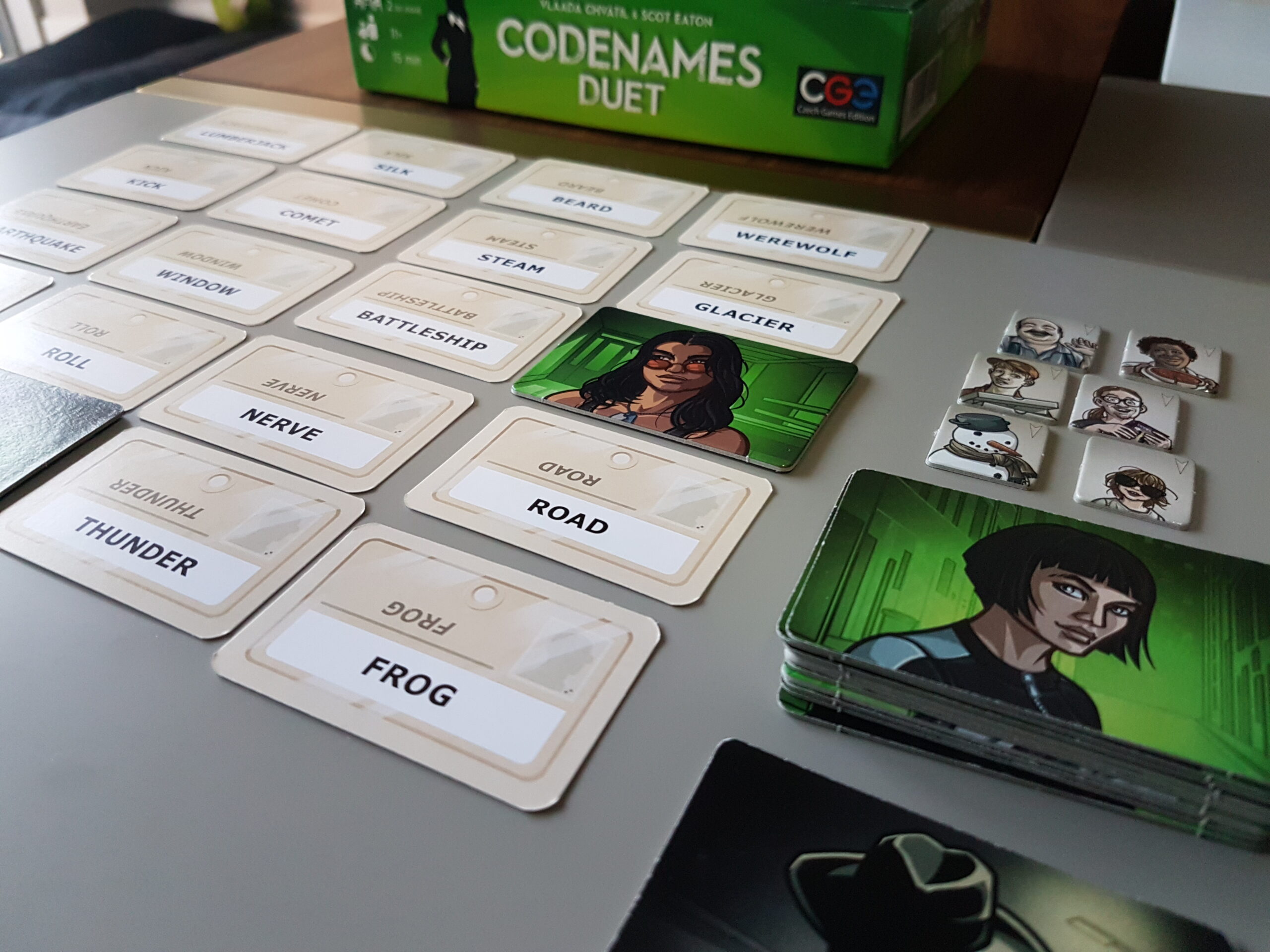
Deception and deduction is Universe. Spider. Iron. Stone. Camera. What’s one word that can connect them all?
If you’re thinking Marvel, you’ll definitely be interested in Codenames (and would probably end up destroying your competition like Thanos himself!).
Synopsis
In codenames, teams try to reveal friendly spies by properly guessing their spy’s codename with only one-word and one-number clues at a time. But, guessing the wrong codename can reveal innocent bystanders, or worse, the assassin (instant game over).
The team that is able to decode the most clues and reveal the most spies without revealing the assassin wins!
To setup the game, randomly select 20 cards from the deck and arrange them in a 5 x 5 grid pattern. Teams divide into two: red and blue. One spymaster from each team is selected, the rest are field operatives.
The spymaster’s jointly look at a shared map card that outlines the grid squares that are associated with each colored spy, bystanders, and the assassin.
To start gameplay, the spymaster from one team looks at the map card, gives a single word hint and a number. The number indicates how many codenames the hint applies to. Using the example above, the Spymaster would say “Marvel, 5”.
The team then guesses which codenames are associated with the hint, one codename card at a time. Correct codenames reveal spies, which are covered by the spymaster.
But once an incorrect codename is selected (bystander or an opposing team spy), or the number of guesses is reached, it’s the other team’s turn.
The spymaster must ensure the hints he/she gives only apply to codenames for friendly spies, otherwise the other team’s spies can be revealed or the assassin. You need to be extra sneaky…
Why it’s Great
Codenames is very easy to explain and can be a lot of fun for larger groups at work. It’s not as intense of a board game as some of the others on this list, but it’s still super engaging.
Codenames is a great way to build communication between colleagues, one word at a time.
Looking for the complete rules to play Codenames Duet? Check them out here.
It’s a scientific fact, office board games can increase productivity, efficiency and morale by up to 17% (individual results may vary). Regardless, get to know your colleagues better and take a well-deserved break to recharge!
So, why not enjoy a coffee, a sandwich and a little friendly competition at your next lunch break…
What board games do you enjoy playing with your coworkers? Let us know your favorites in the comments below!
This article contains affiliate links, which help support this blog at no cost to you!

